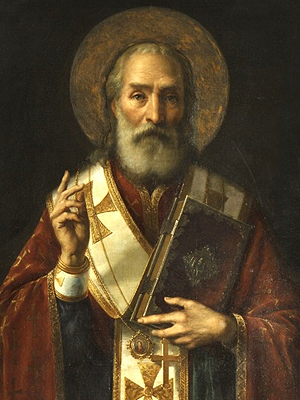|
The Greatest Gift Giver |
||
|
When the name Saint Nicholas is mentioned, it usually brings to mind the Christmas season and images of a portly, jolly man in a red cap and suit bringing gifts, especially for children, as described in old Christmas songs such as "Jolly Old Saint Nicholas" and "Up on the Housetop." The name Santa Claus itself is derived from Sinter Klaas, which is a shortened form of Sint Nikolaas (Dutch for Saint Nicholas), who was celebrated by Christian immigrants to America from the Netherlands in the 17th century. Some of the Christmas holiday traditions associated with Santa Claus and his gift-giving can find their origin with Saint Nicholas, an early church pastor. Saint Nicholas Day, also called the Feast of Saint Nicholas, is celebrated during the season of Advent in various Western and Eastern European countries on December 6 and December 19, respectively, with gifts for children and charity for the poor. According to Christian historical tradition, Nicholas of Myra (270-343) was born in the prosperous maritime city of Patara in the Roman province of Lycia in Asia Minor (present-day Turkey) to wealthy and devout Christian parents. When he was a youth, they perished in a plague that spread through the region. Nicholas inherited their wealth, but he remembered the account in Holy Scripture of the rich young ruler and did not want to be like him by clinging to it and turning away from Jesus in sorrow. He took to heart the Lord's words, "Go and sell your possessions and give to the poor, and you will have treasure in heaven; and come, follow Me." (Matthew 19:16-30; Mark 10:17-31; Luke 18:18-30) Nicholas dedicated his life to serving God and used his inheritance to help the poor, the sick, and those in distress. He was eventually made Bishop of Myra, a city not far from Patara, and became distinguished in the land for his faithfulness to Jesus.
Nicholas had a special love for children, to whom he enjoyed giving gifts, for he recalled Jesus' words, "Permit the children to come to Me, and do not hinder them, for the kingdom of God belongs to such as these. Truly I say to you, whoever does not receive the kingdom of God like a child will not enter it at all." (Matthew 19:13-15; Mark 10:13-16; Luke 18:15-17) This love encouraged him to emulate their kind of trusting faith in the Savior. Nicholas sought to glorify God in the way he gave to the poor and in his generosity to those in need, so he often gave anonymously or in other ways that did not draw attention to himself so that the praise and thanks would go to God. He believed Jesus' word that the Father would see his secret giving and reward Him from His bounty (Matthew 6:1-4). Many extraordinary stories have been told of Nicholas' life and deeds over the centuries that have made him a legend to many and a patron saint of children, the poor, and the financially distressed, among others. Perhaps one of Nicholas' most famous deeds of generosity can be found in Life of Saint Nicholas, believed to be the earliest complete biography of his life, written in the early 9th century by Michael the Archimandrite (814-842). It involved a devout Christian man who once had been rich but through tragic circumstances had become stricken with poverty. The man had three daughters and could not afford dowries for them to marry. Without a suitable means of making money to sustain themselves, they faced the prospect of being sold into slavery. When he became aware of their plight, Nicholas decided to help them, but secretly, to spare them embarrassment and public humiliation. At night, he went to the man's house and tossed a bag of gold through an open window and hastened away. When the father found the gold after daybreak, he was overjoyed and thanked God for this timely blessing and wondered from whom it came. With the dowry in hand, he quickly arranged for his first daughter to be married. Nicholas, seeing the good that came, went to the man's house another night and cast another bag of gold through the same window and hurried home. At dawn, the father saw the bag of gold and cried out to the Lord with great thanksgiving. He also asked God to reveal his benefactor. As with his first daughter, the man gave his second daughter away in holy matrimony. On a third night, Nicholas came to the man's house and, as on the two previous occasions, threw in a gift of gold through the window and quietly departed. This time, however, the father vigilantly remained awake, expecting that the person who provided dowries for his first two daughters would do so for his last one. When the gift fell into the house, the father rushed outside and caught up with his benefactor. When he recognized that it was Nicholas, he fell to his feet with profuse cries of thanks, saying that God through him had saved him and his daughters from slavery and destructive and shameful immorality. Nicholas raised the man to his feet, made him promise not to tell anyone of these blessings, and let him go in peace to arrange for his third daughter to be married. During the reign of Roman emperor Diocletian (284-305), Nicholas and his Christian brethren suffered intense persecution for their refusal to worship the Roman gods. In spite of imprisonment and torture, Nicholas remained faithful to Jesus. Because of this, he was called a Confessor -- one who confessed Christ openly despite imprisonment, torture, or exile. Nicholas was released from prison when Constantine (306-337) became emperor and ended the persecution and, according to some historians, was present at the First Council of Nicaea in 325. He faithfully served the Lord and the people of Myra for the remainder of his days. His life continues to be an example of generosity to those in need, especially children, and a reflection of the love of God through Jesus Christ. The gift-giving of Nicholas was motivated by the amazing grace and mercy of God, who gave His Son Jesus to save all who trust in Him from slavery to sin and the eternal separation from God in the lake of fire that it brings (John 3:16-18; Romans 6:23; 2 Thessalonians 1:6-10; Revelation 20:11-15). Jesus did not redeem our insurmountable indebtedness to God, our sins, trespasses, and iniquities with bags of gold:
The greatest gift you can receive is complete forgiveness of all your sins and the peace and reconciliation with God that comes with it, and this comes solely through trusting in the Lord Jesus Christ, the only Savior and greatest Gift Giver. |
||
| What Is the Gospel? | What Must I Do to Be Saved? | Home | Contact Us | Return | ||

